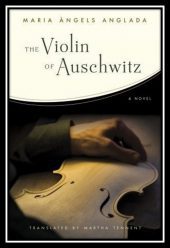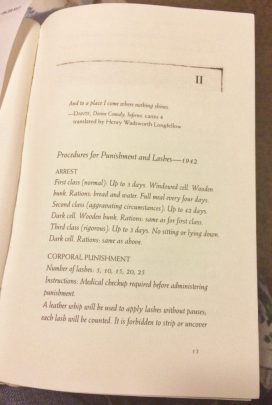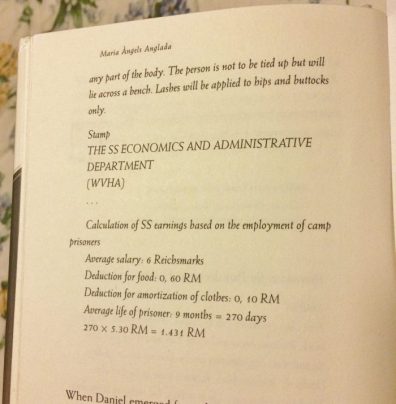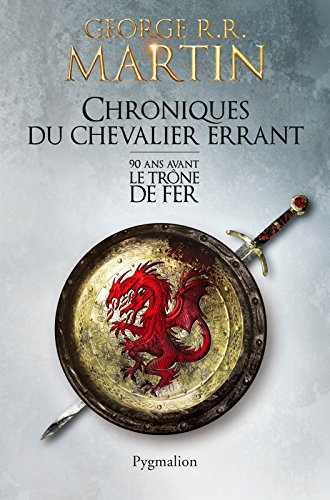




As unlikely as it may be, last month I read two books about WWII that both had ‘violin’ in the title. This one was my favourite of the two, and also counted as my V book, so two birds with one stone? Regardless, it’s a really powerful story and a brilliant translation so I’m happy to share it with all of you!
The Violin of Auschwitz by Maria Àngels Anglada, translation by Martha Tennent
Genre: Historical FictionThe Violin of Auschwitz is the unforgettable story of one man’s refusal to surrender his dignity in the face of history’s greatest atrocity.
In the winter of 1991, at a concert in Krakow, an older woman with a marvelously pitched violin meets a fellow musician who is instantly captivated by her instrument. When he asks her how she obtained it, she reveals the remarkable story behind its origin…
Imprisoned at Auschwitz, the notorious concentration camp, Daniel feels his humanity slipping away. Treasured memories of the young woman he loved and the prayers that once lingered on his lips become hazier with each passing day. Then a visit from a mysterious stranger changes everything, as Daniel’s former identity as a crafter of fine violins is revealed to all. The camp’s two most dangerous men use this information to make a cruel wager: If Daniel can build a successful violin within a certain number of days, the Kommandant wins a case of the finest burgundy. If not, the camp doctor, a torturer, gets hold of Daniel. And so, battling exhaustion, Daniel tries to recapture his lost art, knowing all too well the likely cost of failure.
Buy it from Amazon!
As the blurb hints at, the story is kind of told in a series of flashbacks. We’re introduced to our present (1990s) characters but very quickly switch to 1942 to focus on one man in particular, Daniel, who is interned in a prisoner camp. I much preferred the flashback portion to the present story; the beginning and introductions felt very awkward, and later in the book when we start to flip back into the present, it was sudden and disconnected, and didn’t really separate itself clearly from the past.
What I found both moving and quite startling was that each chapter claimed to begin with a real document from the camps (I say claim because I don’t know whether these were actually real; there were no notes as to where they were acquired from) – such as an incident report when a prisoner was shot or a detailed procedure on how to administer punishment for various offences.


It’s not an easy read. Daniel has his violin-making, which starts to give him hope again in spite of his surroundings, but this hope is in stark contrast to the horrors occurring in the camp and the author doesn’t shy away from these, though nothing is detailed explicitly. Special attention is paid to the use of experiments involving prisoners, as the threat hanging over Daniel is that if his violin repairs are unsuccessful, he’ll be the doctor’s next subject.
WWII novels will always need to deal with heavy content, especially those that focus on Jewish people during this time period, but I think the author’s pairing of this past with the power of music and the beauty of these violins really highlights the human experience, of these survivors’ endurance and hope through it all.
I seem to have gotten really lucky with translations this year. With most of these, I’ve just stumbled upon the books without realizing they were translated but I think next year I’d like to seek out more translated books, to expand my reading beyond typically North American authors.
Advertisements Share this:About the Author: Maria Angels Anglada was a Catalan poet and novelist. She was born in Vic, Spain in 1930. She received a degree in Classical Philology at the University of Barcelona. She died in 1999.
Her first novel, Les Closes, won the Josep Pla Prize. Her 1985 novel Sandàlies d’escuma (Sandals of Foam) won the Lletra d’Or prize.
About the Translator: Martha Tennent is a translator from Catalan and Spanish. She holds bachelor’s degrees in French and in English, as well as a PhD from the University of Barcelona. She has translated a book of short stories and twelve novels (four of which were co-translations). Her shorter translations have appeared in Epiphany, Two Lines, Words Without Borders, A Public Space, World Literature Today, PEN America, and Review of Contemporary Fiction. Two of her translations (one a co-translation) were finalists for the Best Translated Book Award. In 2009 she received a fellowship from the National Endowment for the Arts.





